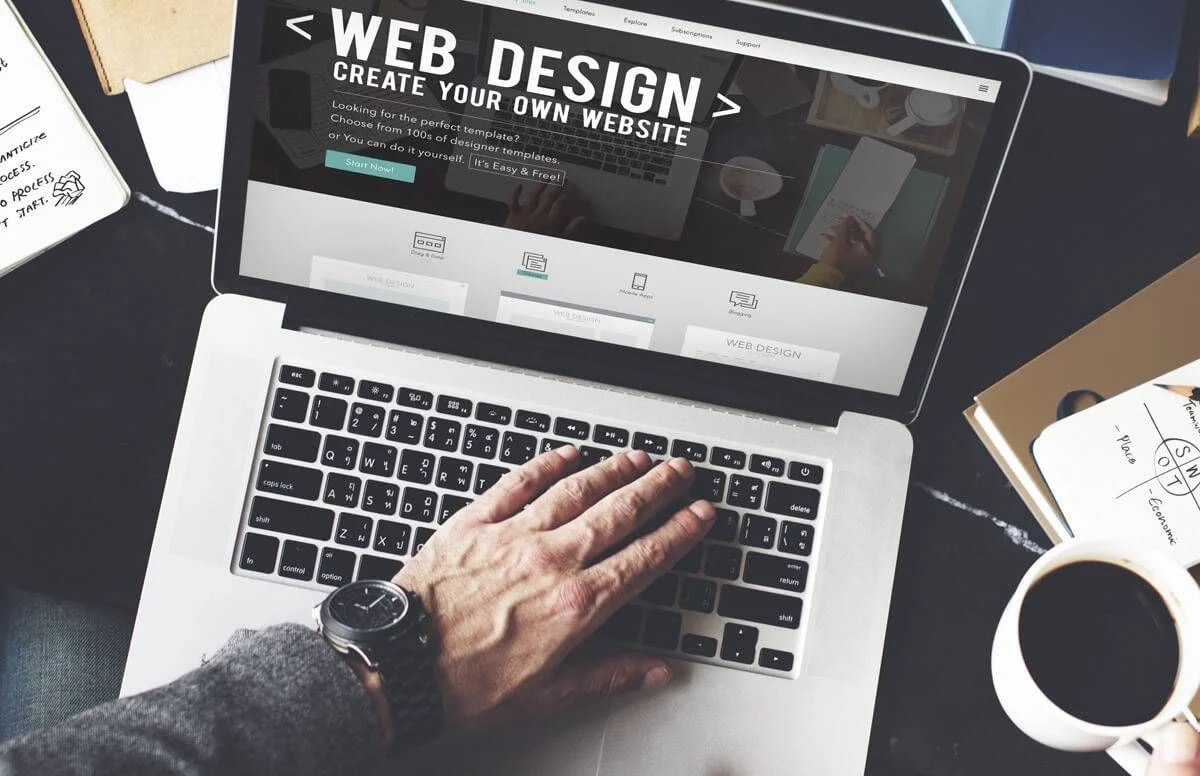Deciding whether to hire a professional or build your own website is a crucial choice for anyone planning an online presence. Each option carries distinct advantages and challenges.
Below, we examine the pros and cons of hiring a professional and creating a website on your own, ensuring you have all the information needed to make an informed decision.
Hiring a Professional

Advantages
- Professional design and functionality ─ A professional web design agency possesses the expertise to deliver a polished and visually appealing website. They consider user experience, responsive design, and overall functionality, ensuring that your site meets modern standards. A professional design is often more engaging, enhancing the visitor’s experience.
- Custom features tailored to your needs ─ A professional can build unique features that match your specific business requirements. Whether it involves integrating complex third-party systems, creating custom forms, or establishing advanced e-commerce capabilities, professionals can tailor the site to align with your goals.
- Time efficiency ─ Building a website requires significant time and effort. Professionals handle the technical and creative tasks, allowing you to focus on running your business or pursuing other priorities. The streamlined process ensures the project is completed efficiently.
- Ongoing support and maintenance ─ Many professionals offer post-launch support. They handle technical issues, updates, and security concerns, ensuring your website operates smoothly. This ongoing assistance can save you from potential headaches.
- Improved SEO and performance ─ A professional understands search engine optimization (SEO) techniques that improve your site’s visibility in search results. They can also optimize the website for faster loading times and better user experience, which are critical for retaining visitors.
- Scalability ─ As your business grows, you may need to expand your website’s capabilities. Professionals can design scalable solutions, ensuring your site can accommodate increased traffic, new features, or additional pages without significant overhauls.
Disadvantages
- Higher costs ─ Hiring a professional often comes with a higher price tag compared to using DIY website builders. The cost can vary based on the project’s complexity and the developer’s expertise. While this is an investment, it may not suit those with limited budgets.
- Dependency on the developer ─ Relying on a professional can lead to dependency on updates and changes. If you need quick edits, you might have to wait until the developer is available, which could be inconvenient for time-sensitive adjustments.
- Less creative control ─ Although professionals work to meet your expectations, you may feel limited in making real-time changes or adjustments. Communicating your vision effectively is critical to ensure the final product aligns with your goals.
- Longer turnaround time ─ Depending on the project’s complexity, building a website professionally may take weeks or even months. While the result is high quality, the waiting period can be a disadvantage for those in need of a quick solution.
Building Your Website Yourself

Advantages
- Lower costs ─ Creating a website yourself is typically more budget-friendly. Website builders like Wix, WordPress, or Squarespace provide affordable tools and templates, making this approach accessible to small businesses and individuals.
- Complete creative control ─ When you build the site yourself, you have total control over its design and content. You can experiment with layouts, colors, and styles to create a site that matches your vision without needing to consult a developer.
- Immediate adjustments ─ DIY platforms allow you to make changes in real-time. This flexibility is ideal for sites that require frequent updates or for those who prefer hands-on involvement.
- Learning new skills ─ Building your own website can be a valuable learning experience. You gain insights into web design, SEO, and basic coding, which may prove useful for future projects or managing your site long-term.
- Speedy setup ─ If you need a website quickly, many DIY platforms offer pre-designed templates and drag-and-drop editors that enable you to create a functional site within hours.
Disadvantages
- Amateur appearance ─ Without professional expertise, the site may lack the polish and sophistication of a professionally designed one. Visitors might view it as less credible, potentially affecting your brand’s reputation.
- Limited features ─ Most DIY website builders come with constraints. Advanced features like custom integrations or dynamic content may not be possible without significant technical knowledge or external plugins, which could result in additional costs.
- Time-consuming ─ Learning the tools, troubleshooting problems, and optimizing your site can consume a significant amount of time. For individuals balancing multiple responsibilities, this can be overwhelming.
- Technical challenges ─ Managing hosting, domains, security, and other technical aspects can be daunting. Mistakes in these areas may result in poor performance or even downtime, which could harm your site’s reliability.
- Less effective SEO ─ Many DIY platforms offer basic SEO tools, but they may not provide the same level of optimization as a professionally built site. This could limit your ability to rank well in search engine results.
- Maintenance and updates ─ Keeping your website updated, secure, and functional falls entirely on your shoulders. If you lack technical expertise, maintaining the site over time can become a burden.
Key Considerations Before Making a Decision

- Budget ─ Determine how much you are willing to invest. If your budget is limited, starting with a DIY platform might make sense. For businesses that rely heavily on their online presence, allocating funds for a professional site may yield better results.
- Time ─ Availability Building a website yourself requires time and dedication. Assess whether you can commit to the process or if outsourcing the work to a professional aligns better with your schedule.
- Complexity of the website ─ Consider the features and functionality your website requires. For a simple blog or portfolio, DIY platforms are often sufficient. For advanced needs like e-commerce, custom dashboards, or multilingual capabilities, a professional is more suitable.
- Long-term goals ─ Evaluate your plans for the website. A DIY solution may work well initially, but as your business grows, you may need professional assistance to scale the site effectively.
Conclusion
Deciding between building your website yourself or hiring a professional depends on your specific needs, budget, and goals. If you value cost-efficiency and hands-on control, creating a website yourself might be the right choice. However, if you prioritize high-quality design, custom functionality, and ongoing support, investing in a professional can deliver long-term benefits.
Take the time to weigh the pros and cons outlined here. By understanding your priorities and resources, you can choose the approach that best supports your vision for a successful online presence.








